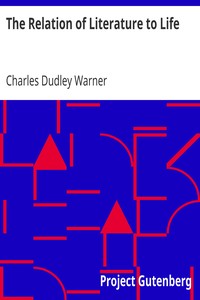The Relation of Literature to Life by Charles Dudley Warner
"The Relation of Literature to Life" by Charles Dudley Warner is a philosophical essay written during the late 19th century. This book explores the profound connections between literature and human existence, arguing that literature is not merely an art form but a fundamental aspect of life itself. Warner posits that literature captures the essence of human experience and serves as a vital source of reflection and moral guidance for society. In the
essay, Warner uses allegorical imagery to illustrate the fleeting nature of most literature, describing authors as builders attempting to construct vessels (books) that might endure through time. He reflects on how the majority of these vessels sink or become lost, highlighting the rarity of truly impactful literature. However, Warner also emphasizes the enduring significance of great literary works, stating that they cultivate a deeper understanding of life, inspire aspirations, and provide comfort to humanity. Through examples ranging from the Bible to the works of poets, he illustrates how literature fulfills a higher need in human nature, significantly influencing personal and societal development. Ultimately, his exploration articulates the essential role literature plays in shaping moral consciousness and fostering emotional connections within cultures. (This is an automatically generated summary.)
Read or download for free
| Reading Options | Url | Size | |||
|---|---|---|---|---|---|
| Read now! | https://www.gutenberg.org/ebooks/3117.html.images | 136 kB | |||
| EPUB3 (E-readers incl. Send-to-Kindle) | https://www.gutenberg.org/ebooks/3117.epub3.images | 120 kB | |||
| EPUB (older E-readers) | https://www.gutenberg.org/ebooks/3117.epub.images | 121 kB | |||
| EPUB (no images, older E-readers) | https://www.gutenberg.org/ebooks/3117.epub.noimages | 113 kB | |||
| Kindle | https://www.gutenberg.org/ebooks/3117.kf8.images | 250 kB | |||
| older Kindles | https://www.gutenberg.org/ebooks/3117.kindle.images | 241 kB | |||
| Plain Text UTF-8 | https://www.gutenberg.org/ebooks/3117.txt.utf-8 | 126 kB | |||
| Download HTML (zip) | https://www.gutenberg.org/cache/epub/3117/pg3117-h.zip | 119 kB | |||
| There may be more files related to this item. | |||||
Similar Books
About this eBook
| Author | Warner, Charles Dudley, 1829-1900 |
|---|---|
| Title | The Relation of Literature to Life |
| Contents | Biographical sketch by Thomas R. Lounsbury -- The relation of literature to life. |
| Credits | Produced by David Widger |
| Reading Level | Reading ease score: 51.0 (10th to 12th grade). Somewhat difficult to read. |
| Language | English |
| LoC Class | PS: Language and Literatures: American and Canadian literature |
| Subject | Literature |
| Category | Text |
| EBook-No. | 3117 |
| Release Date | Dec 5, 2004 |
| Most Recently Updated | Jan 8, 2021 |
| Copyright Status | Public domain in the USA. |
| Downloads | 327 downloads in the last 30 days. |
| Project Gutenberg eBooks are always free! | |

